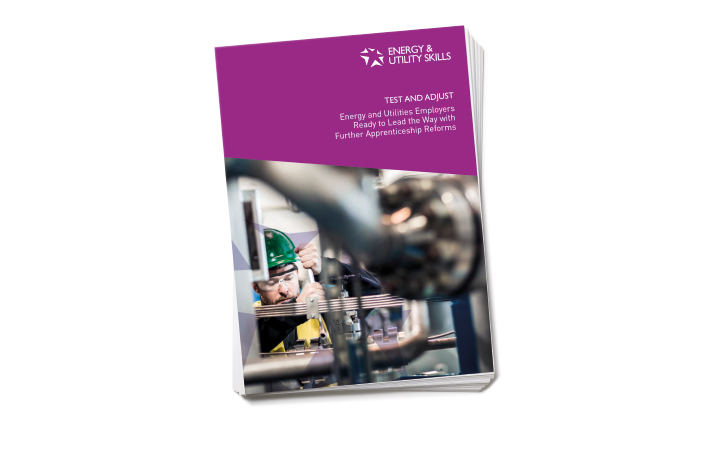Apprenticeships and Technical Education Reforms
The skills arena is experiencing a complete overhaul of the apprenticeship and technical education system, including the introduction of the Apprenticeship Levy on the largest employers, changes development and funding of Apprenticeships, transitioning from frameworks to Apprenticeship standards, reform of every delivery aspect of technical education from entry level to level 5 and the introduction of new T Level qualification.
These changes have been big and bold, and we have welcomed their principles and the renewed focus on Apprenticeships and Technical Education. Our objective is to work across the UK to ensure the energy and utilities sector can maximise and optimise the value of the reforms, ensuring a resilient, skilled and sustainable workforce in gas, power, water and wastewater, and recycling waste management.
About Apprenticeships and the Levy
Apprenticeships are the UK’s flagship programme for delivering employer-led vocational skills training. An apprenticeship is a paid job with role-specific, employer-designed training. The Apprenticeship Levy was introduced in April 2017 and is a tax paid by UK employers whose payroll is over £3m. Employers recover their levy payments by using them to contribute to the training costs of their Apprentices. The training costs of Apprentices in employers that do not pay the Levy are supported through direct government funding. Levy funding is only directly recoverable by English Levy paying employers.
About Technical Education and T Levels
The Post-16 Skills Plan committed to the implementation of all of the recommendations of the Independent Panel on Technical Education (the Sainsbury Report) to introduce a new system of technical education to provide a high quality technical option alongside an academic option for students aged 16-19. Parliament legislated to deliver these reforms through the Technical and Further Education Act 2017.
T-Levels are two-year classroom-based study programmes which include a substantial industrial placement and a new rigorous vocational qualification. There are 15 T Level Routes designed to cover all vocational areas. The first T-Levels will undergo pilot delivery from September 2019. Engineering and Manufacturing T-Levels are scheduled for delivery from September 2022.
On the horizon is a review of Entry Level, Level 1 and Transition year, higher technical qualification reforms, roll out of the NRS, post-18 education and funding modifications and streamlining in the number technical qualifications.
Our Work
Utilities demand more from the Apprenticeship Levy
The independent ‘Test and Adjust’ report for Energy & Utility Skills, undertaken by former Chief Executive of the National Apprenticeship Service, sets out six reforms to improve the Apprenticeship Levy.
The report was commissioned by Energy & Utility Skills and the sectors’ Apprenticeship and Technical Education Advisory Group (ATEAG) to provide empirical evidence of the experience of employers in the power, gas, water and waste management industries in adapting to the apprenticeship and levy policy reforms. It presents employers experience of apprentices emerging from the new policy approach so far, describing what has worked, and suggesting where change and reform could add further value.
The ‘Test & Adjust’ report calls for six further adjustments to make the apprentice system fit for purpose:

A short video summary is available here and click here to access the report.
A summary of the report can be downloaded.
Sector Apprenticeship & Technical Education Advisory Group (ATEAG)
The Apprenticeship and Technical Education Advisory Group (ATEAG) is a UK-wide collaboration of energy and utilities sector apprenticeship levy-paying companies. Established in 2015 to optimise developments in UK apprenticeship policy, the group expanded its remit in 2017 to include the apprenticeship levy and other major UK technical education reforms.
ATEAG sustains a focus on ensuring that the energy and utilities sector is informed and understands the impacts of apprenticeships, levy and technical education policy reforms, responds to policy outcomes, and receives timely updates to support business decision making. The remit of the group is:
- Inform the development and evolution of UK apprenticeship, levy and technical education policy that supports the current and planned needs of energy and utilities sector companies
- Be the sector voice, externally promoting the sector’s needs and liaising with the UK and devolved governments and key stakeholders
- Secure the best outcomes from apprenticeship, levy and technical education reform for the energy and utilities sector
- Optimise the sector’s effectiveness in managing and recovering the apprenticeship levy
Group Chair : Tony Moloney (Cadent)
Deputy Chair: Matt Pitt (Veolia)
We are committed to providing our members with the latest information and ensuring that their knowledge and experience is taken into account to design effective policies. The following Energy & Utility Skills members participate in this group:






















Key Resources
We have developed a number of resources to support our members in understanding the implications of the Apprenticeship Levy for them, and to assist with policy implementation. These documents are available in our exclusive Members Area.
These include:
- Regular FAQs to reflect the latest developments
- Sector guides with easy access to all the relevant government policy and guidance documents published on the revised apprenticeship system, levy and funding
- Sector apprenticeship funding guide for employers
- Positioning papers from the perspective of UK employers
- Regular member communications on latest developments, insight and practices
- Library of key reports and intelligence from a range of trusted sources
Find Out More
Members wishing to find out more about the Apprenticeship Levy and associated activities can contact 0845 077 99 22 or email membership@euskills.co.uk.
